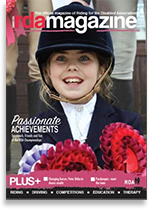For more than 50 years, Riding for the Disabled Association (RDA) has been transforming the lives of disabled people, bringing horses and people together to improve physical and mental health. Disability History Month, running from November 16th to December 16th with its focus on health and well-being, creates an opportunity to highlight the clear and vital role that RDA plays in helping to address the inequalities faced by disabled people when it comes to accessing activity and the natural environment.
85% of RDA participants say that the sessions with RDA are their main way of accessing physical exercise, and that this has a positive, long-term impact on physical and mental health. RDA is a leader in disability sport with a mission to ensure that anyone with a disability can benefit from the unique bond between humans and horses. Riding remains one of the most popular and accessible forms of physical activity for disabled people – 24% of all people taking part in equestrian activity have a disability – a higher percentage than for any other sport (Sport England Active Lives Survey 2019).
RDA Chair of Trustees, Rachel Medill MBE, describes the role that RDA can play. “There is huge unmet demand to provide this kind of specialist support and with our UK-wide network we are uniquely placed and committed to meeting that demand. Whilst the pandemic presented challenges for everybody, disabled people have found it more difficult to remain active. With the help of our network of volunteers, RDA stayed in touch with our disabled participants wherever possible and as soon as we were able to get our Groups running again we gave as much encouragement and support as we could to help them return to their pre-pandemic levels of activity”.
Since its inception in 1969, RDA has evolved and adapted to meet the changing needs of disabled communities. The range of horse-centred programmes now includes carriage driving, vaulting and show jumping alongside dressage and other traditional riding activities, and many RDA centres are now supporting participants with a broader range of disabilities and long-term conditions, including autism, dementia and mental health challenges.
Better access and increased inclusivity remain clear goals for the disabled community and RDA and equestrian sport are well placed to support these aims. For disabled participants at an individual or personal level, the opportunity to be involved with horses can bring so many benefits. The rewards go far beyond the practical experience of developing balance, coordination, and strength; being involved with horses and participating in equestrian sport brings a sense of inclusion in wider society that can sometimes be hard to achieve through day-to-day activities. Inclusivity is a universal human right where society values the unique attributes of every individual. Bringing horses and people together, where all participants are valued equally, demonstrates the best and most progressive values of RDA.
Disability History Month ukdhm.org.uk aims to celebrate the lives of disabled people and to educate and inform those for whom contact with the disabled community is limited. Every week at the hundreds of RDA centres across the UK, disabled adults and children are supported by thousands of volunteers from their local communities, enriching the lives of everyone involved by connecting them with horses.
This activity is only possible because of the valuable donations made by individuals to RDA, and the fundraising activities, sponsorship, and trust funding received from valued supporters of the charity. Donations come in all shapes and sizes, from legacies in a will or a donation in memory of someone special, to small sums donated by text to RDA’s “Text to Donate” facility or fundraisers participating in charity challenge events.
Every donation makes a real difference and can help with training, education, or essential support materials and equipment.


